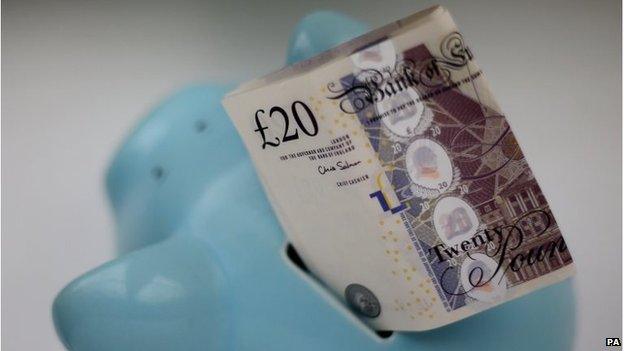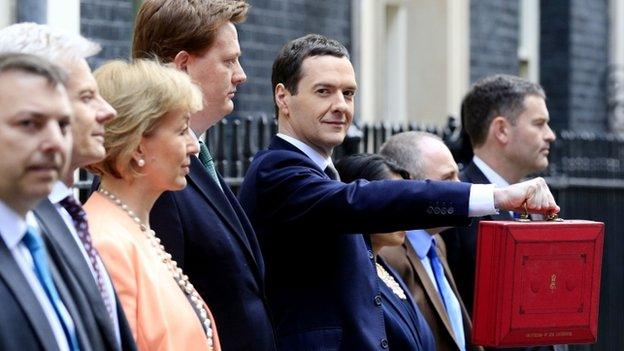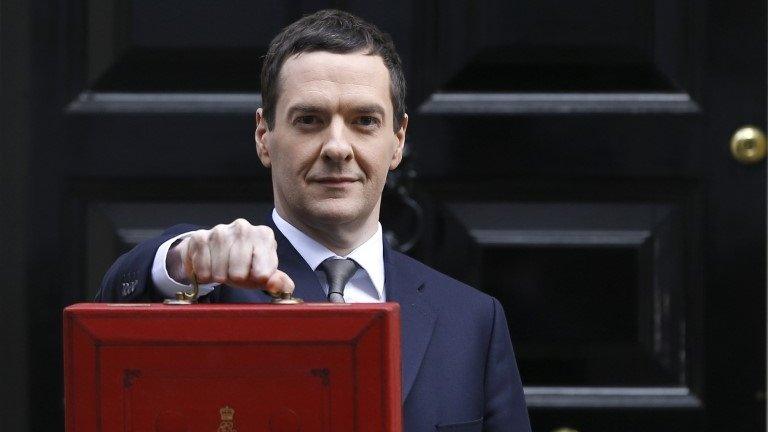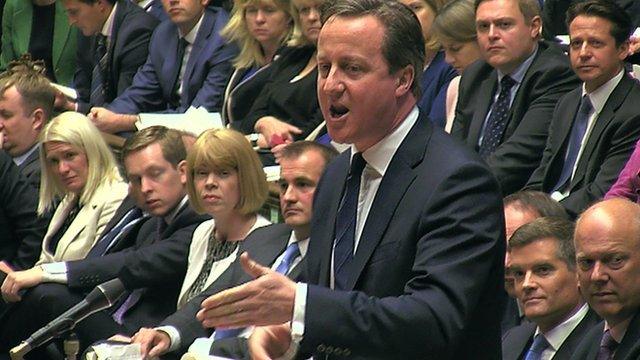George Osborne considering £5bn cuts to child tax credits
- Published

The government is considering reducing tax credits for millions of working families as part of its £12bn welfare cuts, the BBC understands.
Allies of George Osborne are studying an Institute for Fiscal Studies idea to return tax credits to 2003/4 levels, plus inflation - saving £5bn.
Changes would cut entitlements for about 3.7 million low-income families by about £1,400 a year, the IFS said.
Political allies of Mr Osborne say the move would increase incentives to work.
The plan would return the per-child element of child tax credit to its real CPI-adjusted 2003/4 level.
Government sources said it would represent a cutting of the system of tax credits put in place by former prime minister Gordon Brown, which they believe "papered over" poverty in the UK rather than seeking to address its "root causes".
MPs and experts close to Mr Osborne believe reducing current tax credits would see low-income households encouraged to take on more work to keep their family income up.
'Tough fiscal choices'
The IFS has calculated that for the poorest families it would mean a reduction of £845 per child per year.
A family with two children, where at least one parent works full-time, would see their tax credit entitlement running out at £28,847 of gross earnings - rather than £32,969.
However, senior Tory sources suggest that over the years tax credits have allowed big companies to get away with paying employees lower wages.
They say the time has come for a shift from state pay-outs to companies shouldering more of the burden.
David Skelton, director of the Conservative pressure group Renewal, told BBC Two's Newsnight that he agreed the tax credit bill could be lowered.
"The issue at the moment is that we are facing tough fiscal choices," Mr Skelton said.

He added: "What I would like to see is the burden moved away from the taxpayer and from the state towards some big profitable employers.
"The point is you have a lot of employers who are basically getting subsidy from the state for low paid work and we'd like to see a shift towards those employers who can afford to pay the living wage to pay the living wage.
"To encourage workers to work more hours if they can, if they are working part time at the moment. And also get to see a higher minimum wage over time as well.
"So that shift in the burden should come from the state towards employers over the medium term."
The UK can no longer "paper over the cracks of in work poverty", he added.
'Less secure'
Former Conservative minister Damian Green told Newsnight the idea was "clearly one of the options in front of ministers".
"The scale of the cuts, it is quite big, they are necessary and we had a government elected about a month ago on the basis of doing this," he said.
"I don't think anyone can complain that ministers are looking at options."
Stephen Timms, Labour's acting work and pensions secretary, said plans to cut £12bn from social security would hit "working families and children hard".
"It's clear that David Cameron and George Osborne's plan will make working families less secure," he said.
The idea is among many being considered as the Tories wrestle with how to deliver their pledge to cut £12bn from Britain's £220bn budget for benefits and tax credits.
There is widespread concern inside Downing Street that the cuts are impossible to do while repositioning the Conservatives as the party of working people.
'Mea culpa' moment
During the general election, Prime Minister David Cameron promised he would not be cutting many benefits - including the state pension, pensioner benefits, and child benefit.
It means that a large amount of the £220bn welfare budget is now out of bounds.
Many are concerned that there is little way to find £12bn of welfare cuts without cutting the income received by people in work through tax credits.
On Tuesday, Mr Cameron's ex-speechwriter Clare Foges wrote that it was time for a "mea culpa" moment over the bedroom tax, warning it would remain "a fly in the 'one nation' ointment".
A government spokesperson said: "We've already achieved billions in welfare savings over the course of the last Parliament, which have helped cut the deficit in half as a share of GDP.
"As the chancellor and prime minister have set out, further savings will need to be made to continue reducing the deficit, including £12bn of welfare savings through measures including freezing working age benefits."
- Published4 June 2015

- Published3 June 2015

- Published19 March 2015
